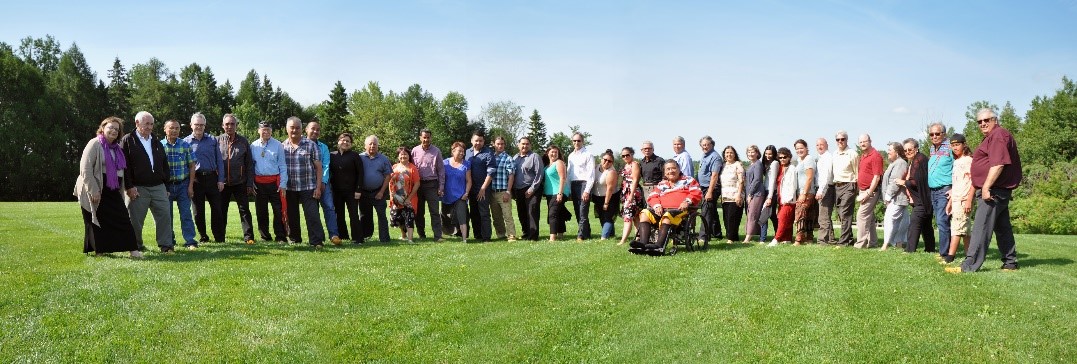The Nuclear Waste Management Organization’s (NWMO) Council of Elders and Youth (the Council) is an independent advisory body that provides counsel on how to apply Indigenous Knowledge in the implementation of the safe and long-term management of used nuclear fuel. The advice provided by the Council on various issues enhances the development and maintenance of good relations with First Nation and Métis communities. The Council has also provided advice on how to strengthen Indigenous representation within the organization at decision-making levels.
The Elders Forum, which was established in 2005, was the starting point of the Council’s formation and was later renamed the Council of Elders in 2012. The Council has now added a youth contingent and currently has 12 Elders and six youth members.
Elder Billie Schibler, also known by her spirit name ‘Purple Harvest Woman,’ is a Métis woman from the Crane Clan who joined the Council in 2012. Her more than 30 years of experience working in the areas of addiction, mental health, justice, family violence, child protection, and healing has made her a tremendous asset to the Council. She has also done substantial work internationally on the protection of water.
“If we would have told scientists decades ago that they would be sitting in ceremony with Indigenous Peoples and learning about the spirit of the land, and the different energies it has, they just wouldn’t believe it,” Elder Billie said.
At the NWMO, we acknowledge that Elders possess an understanding of Mother Earth that constitutes science, sustainability, environmental protection, and much more. We recognize and respect that Indigenous Knowledge Keepers and Elders are the custodians of traditions, customs, and values of their respective societies, forming a link between each generation. The Council aids the NWMO in decision-making and finds opportunities to incorporate Indigenous Worldview and Knowledge into our work.
With so many misconceptions about used nuclear fuel, the Council can be a trustworthy source for communities with questions and concerns about the project.
“It’s important that we take the initiative to better understand what used nuclear fuel is, and how it affects and benefits our lives,” Elder Billie said. “We can’t bury our heads in the sand and pretend it isn’t happening; the Council has a shared responsibility to find solutions.”
The Council works to interweave corporate process, western science, and Indigenous Knowledge in harmony to also help pave the way for other organizations. This became important for the Council when contributing to NWMO’s Reconciliation Policy. “Words are important but how the policy is implemented though actions will be the real test," said Elder Billie.
In 2014, the Council added a Youth component and it is now known as the Council of Elders and Youth.
Jeremiah George, also known by his spirit name ’Blue Thunderbird’, is an Anishinaabe man from the Bear Clan, joined the Council as the newest youth member in March of 2021.
Incorporating youth into the Council of Elders has not only been beneficial for Council members to learn more about nuclear fuel but has helped the NWMO gain fresh perspectives as we recognize that the youth are an important voice in this project as future decision-makers.
“Before I joined, I met with Joe Heil, the NWMO’s Indigenous Engagement Director for northern Ontario. He was in Winnipeg at the time, and I was studying Project Management at the University of Winnipeg. We had a discussion in which he explained the scope of the project to me and the unique phased approach, and it really made me want to learn more,” Jeremiah said.
The Council has done a lot of work with the NWMO on Indigenous policy development and has worked with the NWMO on how to implement Reconciliation in our work in a way that is meaningful and inclusive of all people involved with the project. The Elders and youth work alongside our Indigenous Relations team and technical teams to find well-rounded and community-focused options for the management of used nuclear fuel.
The Council ensures the NWMO is interweaving Indigenous Knowledge into all aspects of our work and within our Reconciliation journey. The Council also suggests opportunities to improve Indigenous relations and engagement like centering our work in relationship and ceremony to further the NWMO’s understanding and add other dimensions to the project.
The Council has ensured we have Indigenous representation at all levels of the organization and advises the NWMO in many areas, including but not limited to the implementation of staff cultural awareness training sessions. They have outlined topics, for example, that should be included like Indigenous rights, history, jurisdiction, and present-day challenges.
“The NWMO is setting a good example of how to work with Indigenous communities, especially by the level of respect for our traditions,” Jeremiah said.
The Council works as a circle and members hold a lot of respect for each other and for the circle.
“We are like a family, all of my relations… it is a collaborative effort and the pain of one is the pain of all. We help each other on this journey and support one another to heal which is beautiful, it is a beautiful Council,” said Elder Billie.
About the NWMO
The Nuclear Waste Management Organization (NWMO) is a not-for-profit organization implementing Canada’s plan to safely contain and isolate used nuclear fuel inside a deep geological repository in a manner that protects people and the environment for generations to come.
Canada’s plan will only proceed in an area with informed and willing hosts, where the municipality, First Nation and Métis communities, and others in the area are working together to implement it. The NWMO plans to select a site in 2023, and two areas remain in our site selection process: the Ignace area and South Bruce, both in Ontario.

